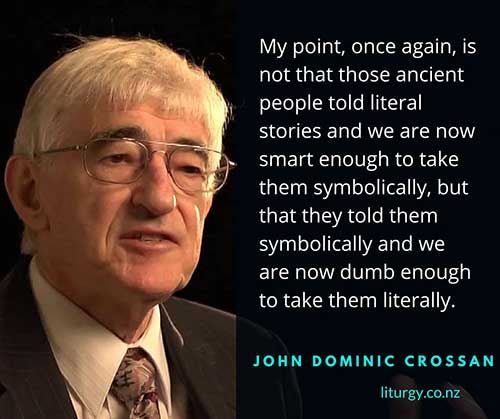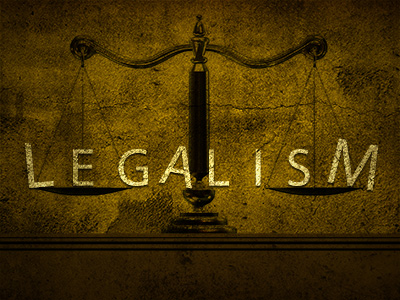Has it ever occurred to you that you might be wrong? Snoopy raises an important point here. As it is for all beliefs and assumptions about the world, doubt is an important part of an honest assessment of our concept of God. It is also essential for any growth in our personal knowledge and relationship with God.
I listened to a podcast a number of years ago of a Christian speaker on the importance of doubt in developing true Christian faith. Doubt, he contended, is the very pinnacle of faith and trust in God as Truth. The man was from Scotland and had a thick Scottish accent. He recounted how after giving this same speech in America a person approached him who told him that he had spoken beautifully, but he had one question, "What's Dooot?".
I started thinking about this subject recently after reading an article on rational thinking and logic fallacies, ways we are less than honest with ourselves in our arguments for a particular viewpoint or belief. The article looks at strategies for cutting through flawed assumptions and false beliefs including one's own.
http://discovermagazine.com/2015/july-aug/16-user-guide-rational-thinking
One of the logical fallacies discussed is confirmation bias, the tendency to focus on evidence that supports our preconceptions and ignore those that do not. We all do this to some degree, but to be intellectually honest and open to truth we need to be aware of the fact and make an effort to seriously examine information that contradicts the way we would like things to be. In other words, in order to be faithful to the truth we need to be skeptical and doubt what we already believe to be true.
Another good articles with references to research on cofirmation bias can be found at the following link:
http://www.theverge.com/2016/11/23/13718636/donald-trump-psychology-confirmation-bias-truth-backfire
God is spirit, and his worshipers must worship in the Spirit and in truth.
Doubt as an act of faith seems to be a paradox. However, what should be noted is that what is being considered and weighed is not God, but our concepts and understanding of God. Scrutinizing our beliefs about God recognizes that God is greater and more than just our limited understanding and concepts. It is also an act of trust that states that if God is Truth, truth is no threat to a real understanding of God. As well, it states that we place gaining a more accurate concept of God over maintaining our current entrenched views.
In a previous post, A God With No Name; The Problem With Personification, I discussed how the Ancient Hebrews rejected the hubris of trying to put God into too small a box by imagining that God can be totally defined by human understanding. Surrounded by cultures with multiple gods and idols, they were aware of this danger. This may have inspired their concept of God, the God with no name. In the Exodus story, the writer has Moses ask God who it is that has sent him and God replies, “I am who I am. This is what you are to say to the Israelites: ‘I am has sent me to you.’ ”. It is from this phrase that YHVH, or Yahweh, became the personal name of God in the Tanakh, the Hebrew Scriptures. Later, in the Priestly Era, even this was replaced with the title, Jehovah, meaning, "The Lord", with the personal name seen as too holy for anything but very special use
____________________________________________________________________________
"Being religious means asking passionately the question of the meaning of our existence and being willing to receive answers, even if the answers hurt."
-Paul Tillich
_____________________________________________________________________________
In most cases our beliefs about God, like most of our ideas and views of the world, are not "ours" at all, but are a reflection of the social or cultural group that we identify with. Most people do not work out a personal stance or viewpoint on very many things and instead trust in the wisdom of authorities and leaders in their own social or cultural group. This is further complicated by the fact that most people do not choose their social and cultural groups or faith community but adopt the ones they were born into without question.
Much of our thinking on contentious issues is influenced by our pre-established social or cultural groups.
Dan Kahan, law professor and science communication researcher at Yale Law School.
When our beliefs and views are tied into our associations and support networks, questioning those dogmas becomes problematic, even threatening. Holding a certain view of the world and a shared understanding of what's true can become a matter of faithfulness to the cultural, social and religious groups that form the basis of our self identity. To question these shared perspectives can be viewed as withdrawing one's allegiance, being ungrateful, or even traitorous.
Once a certain idea or stance becomes associated with a group we belong to (part of what Kahan calls a cultural identity), we become more inclined to adopt that position; it’s a way to show that we belong.
Our understanding or assumptions about the world and about God are further conditioned and set beyond our specific social, cultural and religious groups by our wider culture. The view of reality and what is true and real that is set by our wider culture (the nation/society) is all the more insidious because it is what we take for granted is true because it is, "what everyone knows" and therefore, "the way things are". If we all share the same view and understanding, we take it for granted that it must be "right" and an accurate accounting of reality. However, even a cursory look at the history of thought will tell us that what society believes as "what is" changes. We no longer take for granted that the earth is flat and the sun and planets revolve around us. Most of us no longer assume that certain racial groups or castes of people are inherently inferior to others and require moral guidance. It is difficult to seriously question ideas that you do not even realize are just a perception when our shared acceptance casts it as reality.
Questioning and examining these assumptions and beliefs is not only not a betrayal of Christianity, it is exactly what Jesus taught and encouraged his listeners to do. In another post in this blog, "Is Following Jesus About Turning Off Your Brain?", I argued that Jesus could be considered the poster boy for free thinking and critical reasoning. He used open ended teaching devices like parables to encourage people to look beyond the assumptions of their culture. Jesus was no fan of accepting the authority of past knowledge as truth over reason and inquiry. He opposed allowing authority and literal interpretations of laws and rules prevail over the understanding of broader principles.
Given all this, let me now apply the subject of this piece to myself. Am I wrong? Am I wrong in my current views and concepts of God? To begin with, Yes, Yes I am. This question assumes that there is a "right" view that holds a level of truth above all others and is perfect in itself wherein no further development and growth is needed. However, all concepts of God miss the mark. All words are metaphors and all metaphors are imperfect as they are not the things they seek to describe.
To ask the question differently, "Are my current views further from the truth than my former?" In my youth I would have described myself as an "Evangelical" and a "Biblical Literalist." There are many people in the "conservative" Christian organizations that I belonged to at that time who would say that I have strayed away from the truth.
In High School I was a member of an Evangelical organization called the Full Gospel Business Men's Fellowship and was president of my school's chapter of the Interschool Christian Fellowship. I convinced the school administration to have a reformed career criminal named Ernie Holland give his testimony of conversion to a school assembly. I was also struck by the message of David Wilkerson's book, "The Cross and the Switchblade", and organized a public showing of the film based on the book through a joint venture with the ISCF group at our town's other High School.
I became an intended candidate for ministry with my home church and felt that God was calling me to help bring a wave of Evangelical revival to what I felt was an apathetic main line denomination. At University while working on the Bachelors of Arts that was a prerequisite to a Masters of Divinity, I took the advice of my conservative friends and stayed away from the theological students and took part in the Intervarsity Christian Fellowship. Despite this, I found my preconceptions challenged in University and sought to find a more personal communication with God and way to discern his will that would counter these influences. To this end I joined a fledgling sect led by a man ordained by the United Pentecostal Church that many in leadership with Queens Christian Fellowship were attending. During that time I had the first major occurrence of an ongoing struggle with cyclic depression. A number of the members also had problems with depression and it was interpreted as an act of God, tearing down the old in order to establish the new. After having to drop out from my studies and a number of years "pursuing God" in this fashion, I finally realized that this was not brining me closer to life or to God and actually left town to reframe my direction. To give myself credit, I did not view this as giving up on faith and told myself that I didn't want to, "throw out the baby with the bathwater". However, I knew that I needed to look at my faith in a very different light.
When my mother was diagnosed with terminal cancer a number of years ago my family and I moved to my home town to be closer to her and started attending the Evangelical church she belonged to. My wife and I knew that this church held a very different view of God and Christianity than our own. We soon learned that this community did not respect dissenting views and that if we wanted to remain and not create a disturbance we needed to keep our mouths shut about ideas we disagreed with or held different perspectives on. I made no mention of the fact that when we were directed from the pulpit to write "Pro Family" letters to our Member of Parliament encouraging him to oppose same sex marriage legislation that I wrote to both my MP and the Prime Minister to express my support for it.
http://www.samesexmarriage.ca/advocacy/letters_pm.htm
A couple of years after my mother died we left that church to find a faith community that tolerated a wider range of thought and faith. Feeling freer to express my opinions, those friends from that church who I had social media connections with were dismayed to learn some of my actual faith views.
The direction of my current faith views and some of my current opinions were formed or came together during my time at that church. In many cases they were a reaction to theology and dogma that did not sit well with my heart and didn't match the spirit of the words and actions of Jesus I read in the Gospels. They were also a reaction to the spirit of intolerance, pettiness, and self-righteousness I witnessed this theology foster in this community. I felt that some of the ways that the Scriptures were viewed and approached were less than intellectually honest and that there must be a more truthful perspective for gaining what they have to offer.
My current faith journey has led me to a place where I have a less literalistic interpretation of images of God as a sentient being. I have a more metaphorical view of God and see these images as an anthropomorphism of what is truly legitimate and greater than our individual selves. I also view, "the kingdom of god", and the use of images of an afterlife in the New Testament in a different light. Instead of taking the concepts of an afterlife, Heaven and Hades, literally, I have come to interpret them as referring to the way our influence extends beyond our lifespan in our contribution to cycles of violence and hate, or love and compassion. I have written about this in the blog posts, The Gospel Is Not About What Happens When You Die, and, What Does Jesus' Death Mean To A Non-Literalist?
So, what if I am wrong in the direction of my theology? What if I am straying further from a more accurate understanding of reality and truth? What if God truly is a sentient being who determines the fate of your existence in an alternate reality where your consciousness and awareness of self continue after death?
I can only express my faith that if this is the case that an honest and open search for truth will lead me to that outcome. I also have faith that setting one's sights on exploring and emulating the nature of God as portrayed in the Gospels is at least as important as what doctrines have my intellectual assent. I believe that what I am persuaded to to take as factual or agree with intellectually is not nearly as important as allowing my heart and attitudes be transformed by the message I find in the Gospels. One of the ways I strive to do this is through my study of the Gospels in my other blog, A Literary Look at the Gospels.
I will continue to doubt, reconsider, and readjust, both the views and opinions presented to me and especially my own because I trust in God as Truth. None of our concepts or theology is perfect and I will continue to hold that doubt is truly the pinnacle of faith.
















/images/scan0012.jpg)





















